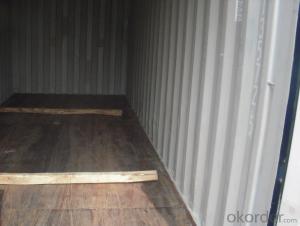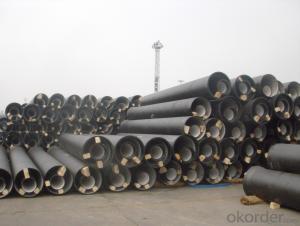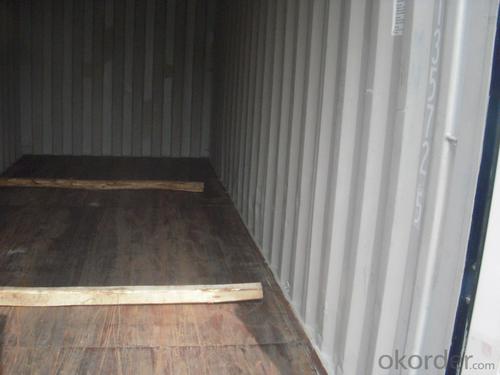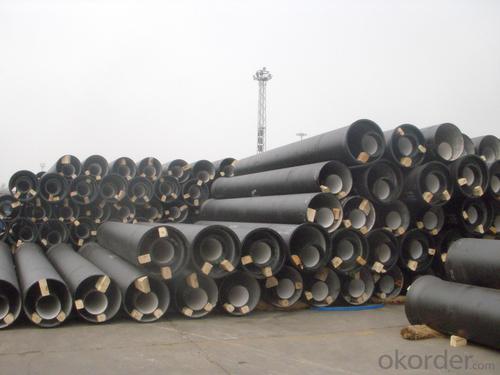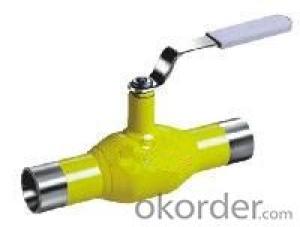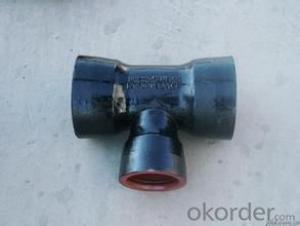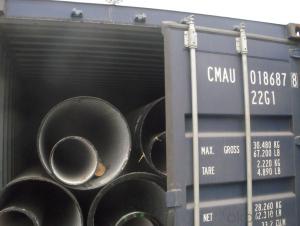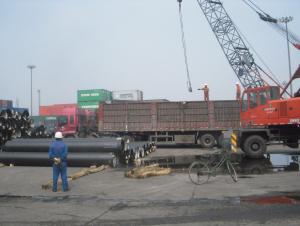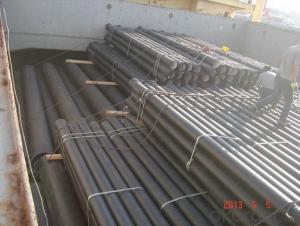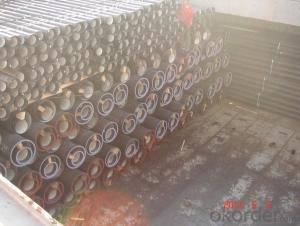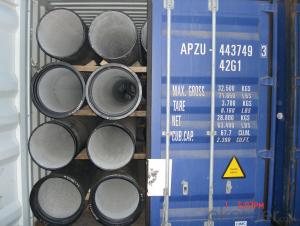DUCTILE IRON PIPES AND PIPE FITTINGS K8 CLASS DN350
- Loading Port:
- Tianjin
- Payment Terms:
- TT OR LC
- Min Order Qty:
- 22 pc
- Supply Capability:
- 3000 pc/month
OKorder Service Pledge
OKorder Financial Service
You Might Also Like
Material : Ductile Cast Iron
Size Range : DN 80mm to DN 2000mm
Unit Effective Length : 6m or 5.7m
Manufacture Standard: ISO 2531:1998/ EN 545:2006/EN 598:2007
Annual capacity : 200,000 tons
Coating Exterior: Zinc 130g/m2 according to ISO 8179-1 and bitumen coating 70 microns.
Cement Interior: Portland Cement/ High Alumina Cement/ Sulphate Resisting Cement Lining according to ISO 4179
Special requirements on external coating and internal lining can be applied
We also provide accessories such as SBR/EPDM rubber gaskets, lubricant paste, pipe caps, PE sleeves, etc.
Additional Parts:
Each pipe is strictly inspected according to related standard to ensure permanently high performance.
Easy Installation at site and service free for life
Long Service Lifespan
Quotation will arrive you within 24hours once we get your inquiry.
We guarantee offering you a competitive price.
A copy of original inspection reports of pipes will be offered after shipment.
Photos of loading process will be sent to the customer after shipment effect.
We will follow-up the delivery progress after shipment effect and update to the customer on weekly basis.
- Q: Are ductile iron pipes resistant to root intrusion?
- Yes, ductile iron pipes are generally resistant to root intrusion due to their strong and durable composition.
- Q: How are ductile iron pipes tested for quality?
- Various methods are employed to test the quality of ductile iron pipes, ensuring they meet required standards and specifications. One commonly used test is the hydrostatic pressure test, wherein the pipes are subjected to high-pressure water or other liquids to detect leaks or weaknesses. Water is typically used to fill the pipes, with the pressure gradually increased to a predetermined level. This test effectively identifies potential defects that could compromise the pipes' integrity. Another important quality test for ductile iron pipes is the tensile test. This involves pulling a sample of the pipe until it breaks, measuring the applied force and elongation. By doing so, the pipe's tensile strength and ductility can be determined, ensuring it can withstand required loads and stresses without deformation or failure. In addition to these tests, other quality checks include visual inspection, dimensional checks, and surface defect examinations. Visual inspection involves scrutinizing the pipes for visible defects like cracks, voids, or surface irregularities. Dimensional checks ensure the pipes meet specified dimensions and tolerances. Furthermore, ductile iron pipes often undergo corrosion resistance tests. This entails exposing the pipes to corrosive environments such as saltwater or acidic solutions to evaluate their resistance to corrosion. This is vital in determining the pipes' durability and longevity, particularly in harsh conditions. Overall, ductile iron pipes undergo rigorous testing to ensure their quality and performance. These tests guarantee that the pipes meet required standards, are safe for use, and can withstand anticipated loads and environmental conditions in their intended applications.
- Q: Can ductile iron pipes be used for oil and gas pipelines?
- Ductile iron pipes can indeed be utilized for oil and gas pipelines. This robust and long-lasting material possesses corrosion resistance, rendering it ideal for the transportation of oil and gas across extensive distances. Moreover, ductile iron pipes display exceptional pressure-bearing capabilities, enabling them to endure the high pressures commonly associated with oil and gas transportation. Additionally, the installation and maintenance of ductile iron pipes are relatively straightforward, further enhancing their suitability for oil and gas pipelines. Nevertheless, it is crucial to acknowledge that the specific application and conditions of the pipeline necessitate careful consideration. Therefore, seeking advice from industry experts is strongly recommended to ensure the appropriate selection and installation of ductile iron pipes for oil and gas transportation.
- Q: Can ductile iron pipes be used in contaminated groundwater systems?
- Yes, ductile iron pipes can be used in contaminated groundwater systems. Ductile iron pipes are known for their high strength and durability, making them suitable for various applications including water and wastewater systems. They have corrosion resistance properties that protect against internal and external corrosion, making them a reliable choice for transporting water, even in contaminated groundwater systems. When dealing with contaminated groundwater, it is essential to consider the level and type of contamination present. Ductile iron pipes are resistant to many common chemicals found in groundwater, such as certain acids and alkalis. However, in cases of severe or specific chemical contamination, it may be necessary to consider alternative pipe materials that offer better resistance to those specific substances. Furthermore, proper installation and maintenance practices are crucial to ensure the long-term performance of ductile iron pipes in contaminated groundwater systems. Regular inspections, cleaning, and the use of appropriate protective coatings can help mitigate any potential risks associated with contamination. Overall, ductile iron pipes can be effectively used in contaminated groundwater systems, provided the level and type of contamination are within acceptable limits and proper installation and maintenance practices are followed. It is always recommended to consult with experts and consider local regulations and guidelines when making decisions regarding the suitability of pipe materials in specific groundwater systems.
- Q: How does ductile iron pipe perform in areas with high ground movement?
- Ductile iron pipe performs well in areas with high ground movement due to its inherent flexibility and strength. Its ability to bend and absorb ground movements makes it less susceptible to cracking or breaking compared to other rigid pipe materials. Additionally, the material's high tensile strength and durability ensure that it can withstand the stresses caused by ground movement without compromising its structural integrity.
- Q: Can the underground cast iron pipes be connected with clamps to form buttress?
- The hoop has the advantages of beautiful appearance, convenient operation, strong clamping force, good sealing performance, etc.. Mainly used for connecting and fastening vehicle, ship, diesel engine, gasoline engine, machine tools, fire, and other machinery and equipment, chemical equipment general nylon hose, plastic hose, hose cloth, water interface and seal etc..
- Q: How does ductile iron pipe compare to steel pipe in terms of durability?
- Ductile iron pipe and steel pipe possess distinct characteristics, but when it comes to durability, ductile iron pipe holds several advantages over its steel counterpart. To begin with, ductile iron pipe boasts exceptional resistance to corrosion. It incorporates a protective layer of zinc or cement lining that safeguards it against rust and corrosion, enhancing its durability and reducing the likelihood of leaks or failures. Conversely, steel pipe is vulnerable to corrosion, particularly when exposed to moisture or specific chemicals. This susceptibility can lead to structural problems and diminish its overall durability. Furthermore, ductile iron pipe exhibits remarkable impact resistance. It can endure substantial loads and external pressures without cracking or breaking, rendering it suitable for applications in high-traffic areas or situations where the pipe may be subject to accidental impacts. Steel pipe, despite its strength, can be more brittle and prone to fractures under similar circumstances. Moreover, ductile iron pipe boasts a longer service life compared to steel pipe. With proper maintenance, it has been known to endure for over a century, making it a dependable and long-lasting choice for infrastructure projects. Steel pipe, although still durable, may necessitate more frequent inspections and maintenance to ensure its longevity. In conclusion, ductile iron pipe surpasses steel pipe in terms of durability due to its corrosion resistance, impact resistance, and extended service life. Nevertheless, the selection between the two ultimately depends on the specific application, budgetary constraints, and other project requirements.
- Q: Can ductile iron pipe be used for agricultural irrigation systems?
- Yes, ductile iron pipe can be used for agricultural irrigation systems. It is a strong and durable material that can withstand the high pressures and corrosive environments often found in agricultural irrigation systems. Additionally, ductile iron pipe has excellent resistance to external loads and impact, making it suitable for various soil conditions in agricultural fields.
- Q: How are ductile iron pipes protected against external impact or loading?
- Ductile iron pipes are protected against external impact or loading through various methods. One common method is to apply a protective coating or wrapping on the pipes, which helps to prevent corrosion and reduces the risk of damage from external forces. Additionally, the pipes are often designed with a thicker wall thickness to enhance their strength and resistance to external impact. Furthermore, the installation of appropriate bedding and backfill materials around the pipes provides additional support and protection against external loading. Regular inspections and maintenance practices also play a crucial role in ensuring the long-term durability and protection of ductile iron pipes.
- Q: Are ductile iron pipes compatible with other pipe materials?
- Generally, other pipe materials can be compatible with ductile iron pipes. The high level of flexibility and strength of ductile iron pipes allows for their connection with various materials like PVC, HDPE, and steel. Transition fittings are often utilized to securely and prevent leaks when connecting ductile iron pipes with other materials. To maintain the integrity of the pipeline system and ensure compatibility, it is crucial to follow industry standards and guidelines when joining different pipe materials.
Send your message to us
DUCTILE IRON PIPES AND PIPE FITTINGS K8 CLASS DN350
- Loading Port:
- Tianjin
- Payment Terms:
- TT OR LC
- Min Order Qty:
- 22 pc
- Supply Capability:
- 3000 pc/month
OKorder Service Pledge
OKorder Financial Service
Similar products
Hot products
Hot Searches
Related keywords
